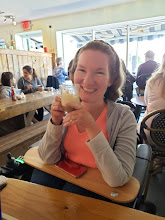I learned some things about myself this year, and one of them is that I have a physical disability that greatly affects the way I live. Some of you who know me are probably pretty confused right now. You're thinking, "Connie, you've been in a wheelchair for most of your life... You were diagnosed with Spinal Muscular Atrophy when you were a baby. What are you talking about?"
But see, I haven't lived like I have a disability. I went to a public school and a liberal arts college and got a regular job for a while... then I became a missionary, moved away from home, traveled the country, and did everything I possibly could without much thought of my limits. Sure, I had to hire some people to do some things for me along the way, I've had to use ramps to get in places, and a wheelchair to move around; I've also had the wretched inconvenience of hospital stays and breathing equipment. But these things all were strangely detached, like they didn't have anything in common. I can't walk, I can't cook, I can't breathe all that well, and I can't fix my hair. But I am a pretty optimistic person, and I'm quick to list off all the things I can do - like write stories and teach and play games and go for long rides by myself on the river greenway. And I was convinced that God would use me to his glory, in spite of my weakness, not because of it.
But at 30 years old, it suddenly hit me that I was disabled - that I had an incurable, progressive disease that would keep taking and taking my strength and independence from me, making my life harder and harder to bear, and that it was not going to get easier or better. I would need more medicine, more equipment, more personal care... I also realized that doctors look at my disease and expect that my life will be shorter than the average American woman... and all this affects my relationships, the urgency I feel in ministry, and my hopes and dreams for my future. And while these are things I probably should have slowly digested over 30 years of life, I kind of just swallowed it all whole, and the weight of it crippled my spirit.
I had the opportunity to go out to California this summer, and decided that while I was there, I wanted to try to meet Joni Eareckson Tada. She has been someone who I have admired since I was a little girl, and I've always been excited to read her books, hear her speak, and follow the growth of her ministry, Joni and Friends. But now things were different. All I really wanted to do was sit next to her and ask, "Joni, how do you do it?" Not in rhetorical awe, but as a genuine question that begs for a real answer. How do you live with such passion and hope in the midst of such a maddening disability that only gets worse? How do you hang on faithfully in this life when you know heaven is going to be infinitely better?
I didn't get to meet Joni. I didn't get to ask her my question. But I did get to visit Joni and Friends, and sit in the chapel room where she sings, and read the Scriptures on the walls, and shake hands with her husband, Ken. I got to hear and see how Joni's disability has given her a new perspective on God's kingdom, and how He has done great and mighty things in this world because she is disabled. Paul's words have new meaning when I put them in the context of all I experienced that day in California - "Now I am glad to boast about my weaknesses, so that the power of Christ may work through me."
Disability is not the end of hope - it is the beginning. If I was whole and healthy and perfect, I would have no need for hope. But when I realize my weakness, my helplessness, and my need, it must lead me to look up and see that the fullness of my strength, power, and ever-present help is in Jesus. And he will not fail me, and his work is not finished in me yet.






Just amazing :)
ReplyDeleteHello! I found your blog through the Joni and Friends 35th Anniversary pinterest board. Thank you for sharing about your life with a disability. This is a beautiful testimony, and it is an encouragement to me.
ReplyDeleteBlessings and joy,
Rachel
Beautifully said Connie...This quote struck a chord with me
ReplyDelete"Disability is not the end of hope - it is the beginning. If I was whole and healthy and perfect, I would have no need for hope. But when I realize my weakness, my helplessness, and my need, it must lead me to look up and see that the fullness of my strength, power, and ever-present help is in Jesus."
I am also realizing after (almost:o) 30 years just how 'disabled' we can be, although not always evident physically, but in our emotions, and minds, and hearts. And it's that realization of our helplessness, and need for hope that leads us right to that ever-present-help...and the Love that loves us in spite of it all.
Thanks for sharing! Be blessed!
Amy Jo~